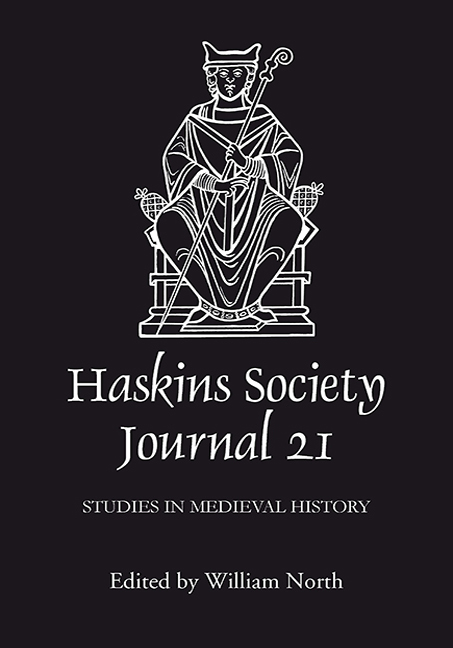Book contents
- Frontmatter
- Contents
- Editor's Note
- Abbreviations
- 1 Bede and the Rewriting of Sanctity
- 2 The Role of Rivers and Coastlines in Shaping Early English History
- 3 Containing Virginity: Sex and Society in Early Medieval England
- 4 Pagans and Infidels, Saracens and Sicilians: Identifying Muslims in the Eleventh-Century Chronicles of Norman Italy
- 5 Robert Curthose and the Norman Episcopate
- 6 The Revival of Roman Law: the Exceptiones Petri
- 7 Mutatis Mutandis: Literary Borrowing from Jerome's Letter to Eustochium and Others in the Life of Blessed Bernard of Tiron by Geoffrey Grossus
- 8 Acting Out Friendship: Signs and Gestures of Aristocratic Male Friendship in the Twelfth Century
- 9 The Quantification of Assarted Land in Mid- and Late Twelfth-Century England
- 10 Origins of Courtliness after 25 Years
8 - Acting Out Friendship: Signs and Gestures of Aristocratic Male Friendship in the Twelfth Century
Published online by Cambridge University Press: 28 April 2017
- Frontmatter
- Contents
- Editor's Note
- Abbreviations
- 1 Bede and the Rewriting of Sanctity
- 2 The Role of Rivers and Coastlines in Shaping Early English History
- 3 Containing Virginity: Sex and Society in Early Medieval England
- 4 Pagans and Infidels, Saracens and Sicilians: Identifying Muslims in the Eleventh-Century Chronicles of Norman Italy
- 5 Robert Curthose and the Norman Episcopate
- 6 The Revival of Roman Law: the Exceptiones Petri
- 7 Mutatis Mutandis: Literary Borrowing from Jerome's Letter to Eustochium and Others in the Life of Blessed Bernard of Tiron by Geoffrey Grossus
- 8 Acting Out Friendship: Signs and Gestures of Aristocratic Male Friendship in the Twelfth Century
- 9 The Quantification of Assarted Land in Mid- and Late Twelfth-Century England
- 10 Origins of Courtliness after 25 Years
Summary
Aristocratic men in the Anglo-Norman period experienced a constant intersection of personal and political relationships. Alliances, treaties, oaths of fealty, and many other political interactions were consistently framed in terms of friendship, while friendship, in turn, was governed by the same kind of orderly rules and standards as other political relationships. This regularity has led many scholars, such as Brian McGuire, Huguette Legros, and Paul Hyams, to treat friendship as an institution in its own right, on par with those of government and religion, and carrying, as Legros puts it, a ‘juridical’ status of its own. People in the central Middle Ages, of course, just as people today, had personal friends to whom they turned for emotional support and companionship; but that kind of relationship was distinct from this institutionalized, political mode of friendship. The latter belongs within the same paradigm as the ‘ennobling love’ that Stephen Jaeger sees in royal relationships. Like ennobling love, political friendship was ‘primarily a public experience, only secondarily private; … primarily a way of behaving, only secondarily a way of feeling’. In other words, although there may very well have been a sincere emotional component in some political friendships, the actual sincerity was much less important to the social work it accomplished than the apparent sincerity as expressed in the public performance of a set group of signs. Therefore, even though Gerd Althoff has argued that friendship alliances ‘lacked the institutional elements which reinforced other co-operative unions’, his assessment of friendship as a community-forming bond, equivalent to kinship and lordship, makes friendship one of medieval society's important structural elements.Essential to the functioning of such political friendships, however, was the existence of a mutually understood vocabulary of gestures and words that could indicate friendship's presence or absence. Hence, Legros is certainly correct in recognizing the formulaic quality in the expression of friendship in chansons de geste. As this essay will argue, contemporary insistence on a similar regularity extended to the depiction of friendship in other narrative sources written in the twelfth century, such as Latin chronicles and vernacular historical poems.
The most important of the standardized elements was a set of words and gestures that communicated the beginning and perpetuation of a friendship.
- Type
- Chapter
- Information
- The Haskins Society Journal 212009. Studies in Medieval History, pp. 147 - 164Publisher: Boydell & BrewerPrint publication year: 2010

